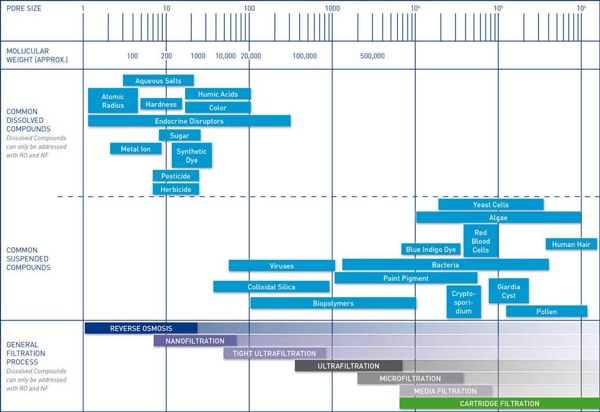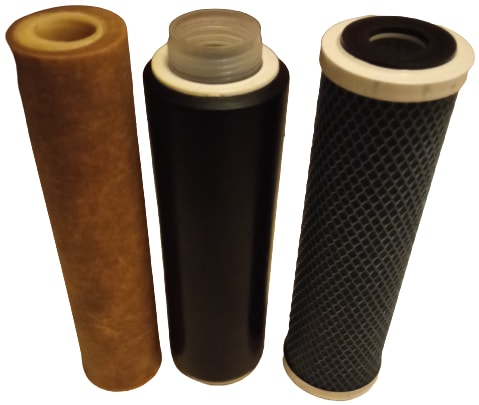The right micron rating for well water depends on what contaminants it contains and what are your filtration needs. You may need a larger micron rating filter at one point and a smaller one at the other, depending on how water is used. Hence, there is no one size fits all solution here.
The micron size of a water filter, known as micron rating, determines what particles it will trap and what particles will pass through the filter.
A micron is equal to one-millionth of a meter. It is a unit of measurement used to define very small things. Micron is denoted with the symbol: μm.
Micron Rating Filtration Spectrum
Consider the filtration spectrum below to understand what particles can be removed using filters and with what micron rating.

Image Credit: X-Flow Pentair
Check out the following examples to understand what’s best for your needs
- A reverse osmosis water filter with a micron rating below 1 is recommended for drinking water for wells with TDS, bacteria, viruses, pesticides, herbicides, and heavy metals.
- A filter with a micron rating of 50-100 is great if you want to filter large particles to reduce the load on your water treatment units, such as whole house filters and water softeners.
- 5-10 micron rating (depending on the size of contaminants) in water is suggested as a pre-filter for ultraviolet purification units.
- A 20-40 micron filter is recommended if you want to remove large particles to protect your appliances and plumbing fixtures.
- A small micron rating is suggested before a carbon filter because large particles will clog the carbon filter quickly.
The above discussion is summarized below.
- Know the contaminants in water: Get your well water tested
- Use a mix of filters: Use larger micron rating filters as pre-filters and smaller ones for drinking water
- Don’t follow the rhetoric of “smaller is always better”: A lower micron filter will remove various impurities, but it has downsides as well; decreased flow rate, and unnecessary clogging, often resulting in frequent cartridge replacement.

Most Common Micron Ratings
50-100 Microns
These filters are commonly used as pre-filters to remove sand, dust, gravel, and iron particles. They are commonly available on the market and come in different shapes. These filters can provide up to 50-100 gallons per minute flow rate based on mesh size, inlet/outlet diameter, and housing size.
25 Microns
Most whole house filters have a sediment cartridge of 25 microns. It prevents most particles from reaching the next cartridges or your home’s plumbing system.
10 Microns
A 10-micron filter can remove chemicals and metals. However, they are not capable of capturing microorganisms.
5 Microns
These filters can capture double the amount of contaminants in water compared to a 10-micron rating filter. They are still not good enough to remove viruses and bacteria.
1 Micron
Cartridges with a 1-micron size are often found in faucet and refrigerator filters. These filters are widely used in filter pitchers and dispensers. These filters can effectively remove microorganisms, TDS, and most contaminants in well water. But the cartridges have a limited life and often clog if exposed to larger particles.
Less than 1 micron
Filters with less than 1-micron filters are often found in RO systems. These filters work slowly but remove almost all contaminants from water. You can find RO membranes up to 0.0001-micron rating. Since they work slowly, most RO filters come with a water tank to store water.
Nominal vs. Absolute Micron Filters
Nominal filters have pore sizes measured approximately to their micron rating. For example, a 10-micron nominal filter will allow some 10-micron contaminants to pass through.
Absolute filters have pore sizes measured to their exact micron rating. These filters don’t allow any impurity to pass through and have a 95-100% success rate. An absolute micron filter has some pre-requisites like water pressure, contaminant concentration, and diameter to perform optimally.
How micron size affects the filtration rate?
Water filters with a smaller micron rating take more time to filter water. Smaller holes don’t allow water molecules to pass through easily. As a result, it takes more time to filter compared to filters with larger micron ratings.
When do you have to replace a micron filter for well water?
A pressure drop, change in water quality (taste & odor), and cloudy water indicate that the filter needs a cartridge replacement.
A larger micron filter (50-100) can last 2-3 years because it can be washed and reused. Water filters with a rating of 20-50 microns last for 9-12 months, and smaller ones have a life of 4-6 months or even 2-3 months in some cases.
How to select the right micron size for your well water?
Get your well water tested to identify the contaminants in water. It will make it easier to decide the micron rating for the sediment filter or other well water. The filter type determines the micron rating. You may need a carbon filter or an ultrafiltration cartridge.
You also need to consider the desired flow rate. The flow rate decreases as the micron size becomes smaller. This is why drinking water systems have a lower flow rate than whole-house units.
What is the micron rating for the pitcher filter?
It depends on a particular model and what contaminants it can remove. Some pitchers have a 0.001 to 1-micron rating that can remove almost all contaminants from water, including microorganisms and TDS. Some come with 1-10 micron ratings recommended for city water or filtering already treated water.
What is the micron rating for a faucet-mount filter?
They generally have a 0-1 micron rating as they are designed to remove chlorine taste & odor, TDS, and sediment. These filters are particularly used for drinking and cooking purposes.
What is the micron rating for a shower filter?
It varies from model to model. The micron rating is a critical factor when buying shower filters, as a slow flow rate while showering is frustrating. The general range is 1-10 microns.
